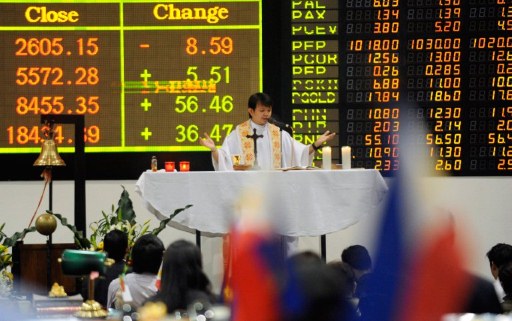PSE strict listing requirements kick in this year

A Filipino priest (C) officiates a mass in front of the electronic board to mark the first trading day of the year at the Philippine Stock Exchange on January 2. AFP
MANILA, Philippines—It’s do or die this year for companies falling short of the 10-percent minimum public ownership requirement for continued listing on the Philippine Stock Exchange as stringent rules have taken effect amid a backdrop of lingering global financial market volatility.
The Securities and Exchange Commission has approved new rules that took effect at the start of the year which mandate that companies failing to meet the minimum public float requirement by December 31, 2012 will be suspended by the PSE for up to six months. After the lapse of the suspension period, they will automatically be delisted from the local bourse, unless they have by then complied with the requirement.
“The upside to enforcing minimum public float levels is the expectation that companies will offer more shares to the public,” PSE chair Jose Pardo said in a text message on Wednesday. “I am optimistic that market will perform better this year with index initially breaching the 4,500 level. Local and regional economic indicators seem to support this optimism.”
Once trading in shares of non-compliant companies is suspended starting the first trading day of 2013, any transaction on stock trades will no longer enjoy the preferential tax rate of 0.5 percent. The Bureau of Internal Revenue will instead slap the 5- to 10-percent capital gains tax on stock trades, seen as a heavy toll for shareholders. Such potential suspension is also seen as a tough proposition for the issuing companies given that they would still have to pay listing fees while they are suspended.
But by shortening the “curing period,” the PSE was able to strike a compromise with the BIR which had long been eager to slap the capital gains tax on non-compliant companies. The PSE’s original grace period for companies to comply with the minimum public float lapsed last November but under the old framework, companies had 36 more months before facing suspension and eventual delisting.
Article continues after this advertisementBy enforcing the suspension more promptly, the BIR and PSE thus found middle ground on the capital gains taxation debates.
Article continues after this advertisementFor companies weeded out by the new rules but still want to go public again, a five-year prohibition on relisting shall apply, the amended rules state.
It’s uncertain, however, how many of around 40 non-compliant companies will brave global market volatility to remain in the PSE’s roster.
“It’s hard to answer,” said Eduardo Francisco, president of BDO Capital & Investment Corp., when asked whether he expected more companies widening their public float this year to avoid delisting. “Yes they want to increase float and avoid penalties but market is currently not too good.”
Under the rules, all listed companies must disclose within 15 calendar days after the end of each quarter a public ownership report.
After determining that the shortfall in public ownership is due to “justifiable” causes and the listed company has a concrete program to restore the public ownership to the required percentage, the new rules state that the PSE may recommend to the SEC a “reasonable” extension of the grace period.
“Justifiable” causes may include tender offers and merger-and-acquisition transactions, the rules state.
The rules also state that a company undergoing voluntary delisting must conduct a tender offer to all stockholders of record. Voluntary delisting is allowed for companies that have acquired more than 90 percent of the issued and outstanding shares of the company through a tender offer. If at the time the petition for delisting is filed, the person proposing the delisting beneficially owns 90 percent or such level aligned with the minimum public float, this person will still be required to make a tender offer.
If non-compliant companies scramble to widen their public float this year in compliance with the PSE’s tighter rules, 2012 is seen becoming another banner year for capital-raising.
Last year, capital raised at the local stock market reached P107.5 billion, the biggest amount raised in a single year. This figure was 26.6 percent higher than the amount raised in 2010 and breached by 19.3 percent the previous record posted during the last stock market bull run of 2007. Capital raising activities included initial public offerings, follow-on offerings, stock rights and private placements.
Capital proceeds from private placement, stock rights offerings and follow-on offerings in 2011 amounted to P42.85 billion, P40.61 billion and P15 billion, respectively.